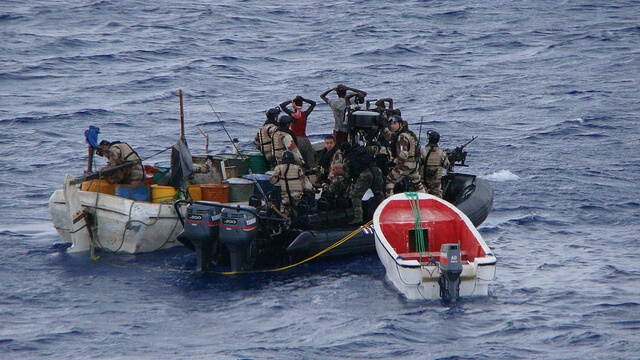Maritime Piracy – After Somalia It’s Western Africa
Piracy at sea or maritime piracy is an ever growing concern for present day seafarers and is proving to be a nightmare for maritime operators. Lately, security issues have drastically increased off the coasts of the Western African nations majorly Nigeria and to some extent off Benin, Togo and Ivory Coast have. However, piracy off the Coast of Somalia still tops the charts.
Somali pirates over the years have shown that they are ready to play havoc using violent tactics by venturing deep afield for kidnapping, hijacking and ransom. Likewise, such tactics are now being used by the pirate bands in the Western African regions. Albeit the security threats have considerably reduced off Somalia, the growing numbers of incidents along the Western African coast undoubtedly reveal that the anti-security measures in place at the moment are entirely scarce.
Recent incidents of maritime piracy off the Nigerian coast show that there have been attacks on the offshore industry as well apart from the regular tanker hijackings. Reports claim a few of the Platform Support Vessels (PSV’s) working for the Nigerian Offshore developments were seized for kidnapping the crew and subsequently for demanding a hefty ransom. Such maritime piracy incidents pose a distress situation for the offshore industry, especially with the intensity of developments swelling up in the area. Certain offshore work vessels are considered “sitting ducks” and are defenceless to the terrorising attacks.

According to experts studying the coastal WAF (Western African region), maritime piracy is distinctively categorized based on various needs –
- Unarmed Robbery – Such attacks are usually carried out at night, on ships at anchor or drifting off the coasts. Robbers steal whatever they get their hands on, chiefly the vessel’s stores. They fear of getting caught and normally are harmless to the ship’s crew.
- Armed Robbery / Forced Attack – Pirates use weapons and violence causing chaos among the ship members who are usually unarmed. They loot the ship and her staff at ‘gun point’ stealing cash, high value stores and personal belongings. Attacks of maritime piracy like these are dangerous as pirates with weapons are fearless and could harm the crew if resisted.
- Hijacking Marine Tankers – The oil-rich Nigerian grounds provide marine tankers with high value cargoes such as crude oils and their products. Pirates target these vessels with the intention of hijacking them and selling off the precious cargo elsewhere. These maritime piracy operations are normally carried out by highly influenced criminal groups with a clear idea of racking millions of dollars.
- Kidnapping – Waters off the Gulf of Aden are infested with the notorious Somali pirates with a sole purpose of seizing the ship, her crew and demand ransom to fuel demands for illegal purposes. Similar methods and intentions have now triggered the criminal gangs of the Western African countries. Maritime piracy attacks as far as 100 nautical miles off the Nigerian coast have been reported recently.
A trend for kidnapping and demanding ransom is evolving. Seafarers and shipping had been anguished by the Somali pirates for a considerable length of time before the security forces jumped into action. Similarly, to protect the interests of seafarers and shipping in general on the coastal WAF regions, advanced security techniques should be used onboard ships. These may include designating a citadel, placing security cameras, tracking devices, hosting armed security personnel, etc.
Local governments and authorities should also participate in deploying methods to protect their waters from pirates. Enduring solutions such as deploying alert coast guards, carrying out regular criminal tribunals and development of anti-security techniques would curb maritime piracy to some extent.
Maritime piracy in the coastal WAF is sprouting ever since the substantial recognition of ‘red zone’ on the continent’s eastern shores. Concerns for the offshore and related maritime sections near the western African coasts are multiplying and it’s only a matter of time that major oil and maritime companies would start shelving their projects for security reasons.
Do you have info to share with us ? Suggest a correction

About Author
Bikram Pal Singh is a professional mariner and blogger. He has sailed extensively, serving on various Oil tankers and Offshore Vessels. He enjoys reading and compiling notes about critical shipboard operations and crew psychology.
Subscribe To Our Newsletters
By subscribing, you agree to our Privacy Policy and may receive occasional deal communications; you can unsubscribe anytime.



